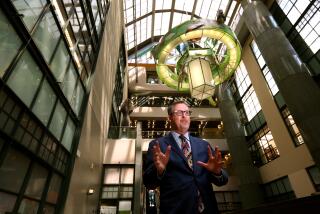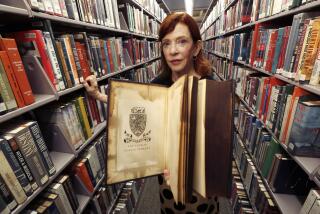JACKET COPY
- Share via
Matthew Fisher, an assistant professor of English at UCLA, knew that libraries all over the world had been digitizing their holdings. But he was frustrated by the difficulty in finding what he was looking for -- in particular, medieval manuscripts. A Google search for “Edward the Confessor” might turn up 20 pages of results before the book, the oldest surviving Anglo-Norman history of the king, appears; it’s at Cambridge University, and they’ve put it online.
Rather than telling Cambridge it was time they hired an expert in search-engine optimization, Fisher decided to collect links to these works himself. Launched late last year, the Catalogue of Digitized Medieval Manuscripts (manuscripts.cmrs.ucla.edu) is functional if not pretty. But it does link to almost 1,000 manuscripts by 193 authors in 20 languages, collected by 59 libraries.
Of those manuscripts, UCLA has 48. Which means that the online catalog has greatly expanded its collection, if virtually. Is this the library of the future? A distributed network of collections of terrestrial libraries, curated by specialists?
It sounds good, but the collection-of-links model is problematic. Creating curated lists of links was vital to the early Internet, when search was spotty; lists of links is where Yahoo got started. But I worked at one of these sites (the Ultimate Band List, ubl.com) where we soon realized that we’d ceded control to the sites we’d linked to -- and they often changed. Sure, bands are flakier than libraries, but libraries can still update their naming protocols, change a frame-based site to one without frames, or move the collection into a new database-driven site. In other words, the Internet addresses of digital collections can easily change.
One other option is a massive, centralized digitized library, such as Europeana ( www.europeana.eu). It launched in November with 2 million digitized items on its servers from 1,000 libraries and museums across Europe. And when it got 10 million hits an hour, it swiftly crashed. (A test version of Europeana is now live; be gentle.)
Centralizing can be good, but it needs substantial infrastructure.
Still, whatever the library of the future might be, it’s lovely to look at the literary past.
Carolyn Kellogg
--
latimes.com/jacketcopy
For more books coverage, read the Jacket Copy blog.
More to Read
Sign up for our Book Club newsletter
Get the latest news, events and more from the Los Angeles Times Book Club, and help us get L.A. reading and talking.
You may occasionally receive promotional content from the Los Angeles Times.








